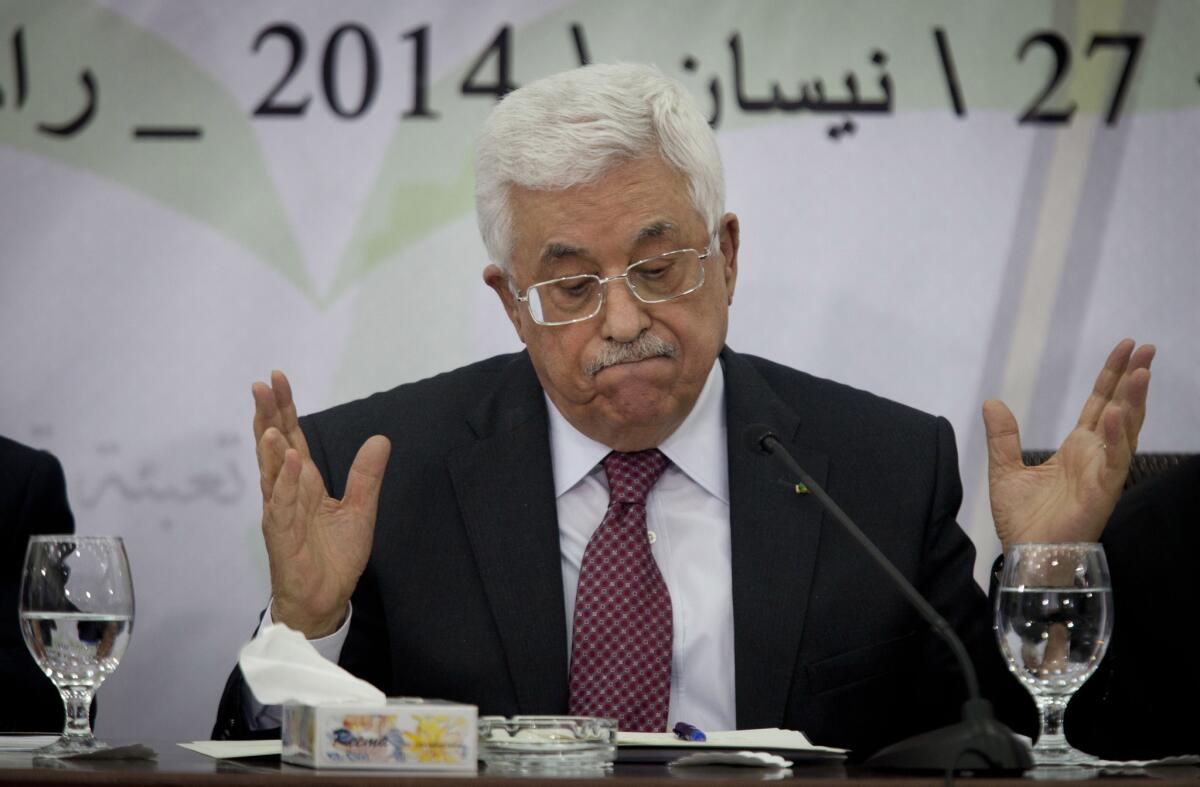Palestinian leader says unified government will recognize Israel

- Share via
RAMALLAH, West Bank — Seeking to calm critics of his reconciliation efforts with the militant Hamas group, Palestinian Authority President Mahmoud Abbas said Saturday the unity government he plans to head will renounce violence and recognize Israel.
Abbas, who rules in the West Bank, and Hamas, the fundamentalist Islamic movement that has controlled the Gaza Strip after ousting Abbas’ forces in a brief armed battle in June 2007, reached an agreement on Thursday to reconcile their differences.
Israel strongly criticized the new pact and said it would not negotiate with a Palestinian government that included Hamas, which it and others consider a terrorist organization. The U.S. said it would talk with the new government only if it recognized Israel, renounced violence and accepted agreements reached with Israel.
Abbas criticized the Israeli position, saying that when there was a division between his backers and Hamas, Israeli Prime Minister Benjamin Netanyahu used to say that Abbas does not represent all Palestinians. And now that the West Bank and Gaza are about to reunite, Netanyahu says he will not negotiate with Abbas because he is working with Hamas.
Nevertheless, in a bid to assure Israeli and U.S. leaders, Abbas said at the opening session of a two-day meeting of the Palestine Liberation Organization’s Central Council here that even though the new unity government will have nothing to do with negotiations, it will follow his own political platform.
“I recognize Israel and it [the new government] will recognize Israel,” he told the 120-strong Central Council, the PLO’s second highest legislative body.
“I reject violence and terrorism and the government will also reject violence and terrorism, and I recognize international legality and international commitments and the government will be committed to what I am committed to,” he said. “No one can claim that this will be a government of extremists.”
International officials who met with Abbas in the last few days said he assured them of the same thing.
Robert Serry, special United Nations coordinator for the Middle East peace process, said in a statement after meeting Abbas on Thursday that he was assured that the agreement with Hamas would be implemented under the leadership of Abbas and the PLO.
“President Abbas emphasized that these commitments include recognition of Israel, nonviolence and adherence to previous agreements,” said Serry, who added that the United Nations continues to support Palestinian unity “on this basis as the only way to reunite the West Bank and Gaza under one legitimate Palestinian Authority.”
Abbas noted that the new government would be composed of “independent technocrats,” meaning it would not include any person from Hamas or even his Fatah party, and that its mission would be to run the daily affairs of the Palestinian territories and prepare for the long overdue presidential and legislative elections.
He said current Prime Minister Rami Hamdallah had told Abbas that he would resign as soon as the unity government was formed.
Negotiations with Israel, said Abbas, “are the job of the PLO because it represents the Palestinian people everywhere and has the authority to negotiate on behalf of the Palestinian people.”
In addition to being president of the Palestinian Authority and head of the Fatah movement, Abbas has also served as chairman of the PLO since the death of its former leader, Yasser Arafat, in 2004.
The agreement with Hamas, whose Central Council members have nevertheless boycotted the Ramallah meeting in spite of the reconciliation steps, along with the crisis in the negotiations with Israel are among the items the Palestinian body will discuss in its meeting.
Abbas said he was ready to extend negotiations with Israel, which officially end in three days, by three months if Israel would release the last group of long-detained Palestinian prisoners it had said it would set free when the talks started in July, freeze all settlement activities in the West Bank and East Jerusalem and present a map showing the borders of the Palestinian state.
He said that without the three things, there would be no more negotiations.
President Obama said on Friday that there would be “a pause” in the negotiations until the parties came up with alternatives to salvage them.
Abukhater is a special correspondent
More to Read
Sign up for Essential California
The most important California stories and recommendations in your inbox every morning.
You may occasionally receive promotional content from the Los Angeles Times.













